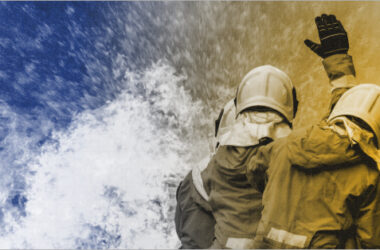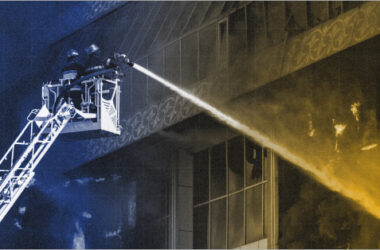- Fire Insurance is a type of property insurance that provides coverage for losses or damages caused by fire.
- It protects insured properties, including buildings, structures, contents, and personal belongings, from fire-related risks.
- Fire Insurance Policies typically cover the cost of repairing or replacing property damaged by fire, as well as associated expenses such as debris removal and temporary accommodations.
- Coverage may extend to fire damage caused by various sources, including electrical faults, arson, lightning, and wildfires.
- Fire Insurance Policies may also offer additional coverage options, such as coverage for smoke damage, water damage from firefighting efforts, and business interruption losses resulting from fire-related closures.
- Policy terms, coverage limits, deductibles, and exclusions can vary depending on the insurance provider and the specific policy purchased.
- Premiums for Fire Insurance are typically based on factors such as the value of the insured property, its location, construction materials, fire protection measures, and the insured’s claims history.
- Fire Insurance is essential for property owners to mitigate financial risks associated with fire damage and ensure prompt recovery in the event of a fire-related loss.
Why is Fire Insurance Important?
When a business suffers accidental fire damage, the costs can be astronomical. Not only is there the cost of repairs or replacement of the damaged property, but there is also the potential for lost revenue if the business has to shut down for an extended period. Fire Insurance can help cover these costs and get the business up and running as quickly as possible.
And that’s the reason, the awareness around Fire Insurance has increased in India. Globally, the global Fire Insurance market achieved a valuation of US$ 69.0 billion in 2022. Looking ahead, researchers anticipate that the market will expand to US$ 106.8 billion by 2028, showcasing a compounded annual growth rate (CAGR) of 7.24% over the period from 2023 to 2028. Talking about India, Fire Insurance has recorded a positive growth of 7.1% in FY 22, as suggested by Invest India.
The benefits of Fire Insurance can be listed as follows–
- It provides protection against any loss or damage caused by any movable or immovable object that catches fire and explodes.
- It covers property damage caused by a fire, such as damage to furnishings, office buildings, machinery, stock, and so on.
- Aside from fire perils, it may cover damages caused by any natural calamity, explosion, water tank bursting, and so on.
Who Should Buy Fire Insurance?
- Firm or organization
- Shops or godown
- Medical clinics, hotels, lodging service
- Building, furniture, or household items
- Finance & research institutions, banks
- Industrial or manufacturing firms
Insurable Interest In Fire Insurance
The concept of insurable interest is a crucial element in insurance that forms the basis for the legality of any insurance agreement. It asserts that, in order for an insurance policy to be binding, the policyholder must possess a genuine financial stake in the item or situation covered by the policy. Put simply, individuals purchasing insurance should face potential financial harm or disadvantage if the insured event takes place.
Absent this monetary interest, an insurance contract is viewed as speculative and usually cannot be enforced. There are both legal and moral reasons for upholding the principle of insurable interest. Legally, it ensures that insurance contracts are not used as a means of speculative investment. Morally, it upholds the principle that insurance is supposed to provide protection against financial loss rather than a means of profiting from someone else’s hardship.
As a policyholder, you must hold a genuine financial interest in the property or asset you are insuring against fire risks. It is through this financial interest that insurance contracts are based on real risks and responsibilities, rather than on speculative gains. If there is no such stake or interest, the insurance contract would have no valid basis and could be misused.
Types of Fire Insurance Policy
Different types of Fire Insurance Policies are designed to cater to the unique needs of businesses. Some of them are discussed below-
- Standard Fire and Allied Perils Policy
Under the “Standard Fire and Allied Perils Policy”, also known as SFSP, the following hazards are covered:
- Fire
- Lightning
- Implosion/Explosion
- Damage to aircraft
- Strike, riot, and malicious damage
- Storms, typhoons, cyclones, tempests, tornadoes, floods, hurricanes, and inundations
- Impact damage
- Landslide and subsidence
- Tanks, apparatus, and pipes burst or overflow.
- Testing operation of missiles
- Automatic Sprinkler Installations leakage
- Fire spreading out of the bushes.
Additional covers can be inducted into the SFSP policy by endorsement and by paying additional premiums.
B. Special Policies
- Floater Policy in Fire Insurance
This policy is only issued for stocks stored in warehouses/godowns at various locations but belonging to the policyholder. Stocks in godowns where there is a frequent inter-godown movement of stock, and where it is not possible to record every movement of stock in and out of godowns, are covered by this policy. It is possible to obtain a floater policy in Fire Insurance that covers one sum insured over all the godowns in a company.
2. Declaration Policy
When there are frequent fluctuations in stock values/stocks, this type of policy is useful to avoid underinsuring (ensuring lower values). As per the agreement, stock values are to be declared periodically, e.g., monthly, and the premium is calculated based on the average stock values at the end of the policy year. Excess premiums, if any, are refunded to the policyholder.
3. Floater Declaration Policy
Stock lying at various locations and fluctuating stock value are both part of the above-mentioned policies.
Fire Insurance provides covers the following assets
Fire Insurance typically provides coverage for assets that are damaged or destroyed by fire. These can include:
- Buildings: Fire Insurance can cover the cost of repairing or rebuilding a premise that has been damaged or destroyed by fire, including the structure itself, as well as fixtures and fittings.
- Stock: Fire Insurance can cover the value of inventory, goods, or merchandise that has been damaged or destroyed by fire, including raw materials, finished products, and work in progress.
- Contents: Fire Insurance can also cover the cost of replacing or repairing personal property that has been damaged or destroyed by fire, such as furniture, electronics, and other belongings.
Regulatory and Implementation Principles for Fire Insurance
A set of fundamental principles governs Fire Insurance. These principles ensure the fairness, transparency, and efficacy of insurance arrangements for both policyholders and insurers.
Insurable interest: Insurance against fire-related risks is not available without an insurable interest in the property, such as ownership or legal interest.
Utmost good faith (Uberrimae Fidei): If an accurate description of the property is not provided or if facts are concealed, a policy can be voided.
Indemnity: Fire Insurance payouts should cover the insured’s financial losses, but not allow them to profit from them.
Subrogation: Insurance companies are often allowed to pursue legal action against third parties who may have caused a fire. This practice prevents the insured from collecting insurance proceeds and then suing the negligent party.
Proximate Cause: Unless the fire results from a covered peril as defined in the policy, the claim may not be accepted.
Contribution: Insureds are not entitled to be compensated for more than they have lost, according to this principle.
Deductibles: Insurance premiums can be reduced by increasing the deductible, but the insured must be prepared to pay these costs in the event of a claim.
Exclusions and limitations: It may include specific fire causes not covered by the policy (e.g., arson by the insured) or limits on coverage for certain items (e.g., valuable artwork or jewelry).
Premiums: Many factors influence premiums, including the value of the property, its location, fire protection measures, and the deductible chosen.
Policy conditions: Insureds should carefully review the terms and conditions outlined in their insurance policies, and adhere to any requirements they must fulfill to maintain coverage. Non-compliance can result in claim denials.
Fire Insurance is founded on these principles, which ensure fairness, transparency, and effective risk management.
12 Perils of Fire Insurance
The 12 perils typically covered by Fire Insurance Policies include:
- Fire: Damage caused by flames resulting from combustion.
- Lightning: Damage caused by lightning strikes leading to fire.
- Explosion: Damage caused by explosions, whether internal or external.
- Riot and Civil Commotion: Damage caused by riots, civil unrest, or public disturbances.
- Malicious Damage: Damage intentionally caused by individuals with ill intent.
- Aircraft Damage: Damage caused by aircraft or objects falling from them.
- Impact Damage: Damage caused by vehicles or objects colliding with the insured property.
- Subsidence and Landslide: Damage resulting from ground movement, including subsidence and landslides.
- Bursting or Overflowing of Water Tanks, Apparatus, and Pipes: Damage caused by the sudden release or overflow of water.
- Storm, Cyclone, Typhoon, Tempest, Hurricane, Tornado, Flood, and Inundation: Damage caused by severe weather events, including windstorms, cyclones, hurricanes, and flooding.
- Earthquake: Damage caused by seismic activity, including tremors and earthquakes.
- Bush Fire: Damage caused by wildfires or bushfires.
These perils may vary depending on the specific terms and conditions outlined in the insurance policy, and additional coverage may be available through endorsements or supplementary policies. It’s essential for policyholders to thoroughly review their insurance contracts to understand the extent of coverage provided for each peril.
What is Not Covered under Fire Insurance?
There are several exclusions in a typical Fire Insurance Policy in India. Some of them are as follows-
- Willful or deliberate acts
- Cold storage stock losses or damage due to temperature changes
- Loss, destruction, or damage directly or indirectly due to war or war-like situations
- Loss, destruction, or damage directly or indirectly caused by nuclear peril.
- Loss, destruction, or damage to the insured property due to contamination or pollution
- Missing property
- Earthquake or Volcanic eruption
- Damages caused by consequential or indirect losses.
- The cost of preparing any claim, including fees and expenses
- A building or premises that is unoccupied for more than 1 month.
- Stones, bullion, or artwork not set, unless otherwise specified.
- Excluding loss or damage to any electrical machine, short circuit, apparatus, leakage of electricity, etc. This exclusion applies to a particular machine.
- Loss or damage due to an act of terrorism, unless specifically covered.
- Loss or damage by spoilage originating from the retardation, interruption, or cessation of any operational process.
- Loss by theft during or after the occurrence of any insured peril (except those provided under Strike, Riot, and Terrorism Damage cover).
- Excess Clause:
- The first 5% of each claim, with a minimum of Rs. 10,000, for losses arising from “Act of God perils” like Lightning, STFI (Storm, Tempest, Flood, Inundation), Subsidence, Landslide, and Rock Slide.
- The first Rs. 10,000 of each loss for other covered perils.
- The excess applies per event per insured.
- War and Kindred Perils:
- Loss, destruction, or damage caused by war, civil war, rebellion, revolution, insurrection, or military force, whether declared or not.
- Nuclear Peril:
- Loss, destruction, or damage directly or indirectly caused to insured property by nuclear reactions, radiation, or radioactive contamination.
- Pollution or Contamination:
- Loss, destruction, or damage caused to insured property by pollution or contamination, including but not limited to environmental pollution.
- Electrical and Electronic Damage:
- Loss, destruction, or damage to any electrical or electronic machine, apparatus, fixture, or fitting (excluding fans and electrical wiring in dwellings) due to overrunning, excessive pressure, short circuiting, arcing, self-heating, or leakage of electricity.
- Consequential or Indirect Loss:
- Loss of earnings, loss by delay, loss of market, or any other consequential or indirect loss or damage resulting from a covered peril or any disruption.
- Earthquake and Volcanic Eruption:
- Loss or damage due to earthquakes or volcanic eruptions unless specifically covered under the policy with an additional premium.
- Terrorism:
- Loss or damage due to acts of terrorism unless specifically covered under the policy.
- Spoilage:
- Loss or damage caused by spoilage resulting from the retardation, interruption, or cessation of any process or operation caused by a covered peril.
- Theft:
- Loss or damage by theft during or after the occurrence of any insured peril, except as provided under Riot, Strike, Malicious, and Terrorism Damage cover.
- Property Removal:
- Loss or damage to insured property if removed to any building or place other than the insured location, except machinery and equipment temporarily removed for repairs, cleaning, renovation, or similar purposes for a period not exceeding 60 days.
Add-On Covers in Fire Insurance Policies
In addition to the standard coverage provided in Fire Insurance Policies, insurers may offer various add-on covers to cater to specific needs and risk exposures. Some common add-on covers include:
- Combustion (by Fire Only):
- Extends coverage to damages caused by combustion resulting from fire.
- Earthquake (Fire and Shock):
- Provides coverage for damages caused by both fire and shock resulting from an earthquake.
- Forest Fire:
- Extends coverage to damages caused by forest fires.
- Impact Damage due to Insured’s Own Vehicle:
- Covers damages caused by the insured’s own vehicle or articles dropped from them.
- Deterioration of Stocks in Cold Storage:
- Provides coverage for deterioration of stocks due to accidental power failure or change in temperature in cold storage premises.
- Architects Fees:
- Covers fees for architects and other professionals involved in reconstruction or repair, typically exceeding 3% of the claim amount.
- Debris Removal:
- Provides coverage for the cost of removing debris after a covered loss, typically exceeding 1% of the claim amount.
- Omission to Insure Clause:
- Covers additions, alterations, or extensions made to the insured property during the policy period, ensuring coverage for new additions.
- Spoilage Material Damage Cover:
- Applicable to stock and machinery containers, covering damages due to spoilage.
- Leakage and Contamination Cover:
- Provides coverage for damages caused by leakage and contamination.
- Temporary Removal of Stocks Clause:
- Covers the temporary removal of stocks to another location for repair, renovation, or other purposes.
- Loss of Rent Clause:
- Provides coverage for loss of rental income due to damage to the insured property.
- Insurance of Additional Expenses of Rent for An Alternate Accommodation:
- Covers additional expenses incurred for renting an alternate accommodation due to damage to the insured property.
- Start-Up Expenses:
- Covers expenses incurred in restarting business operations after a covered loss.
These add-on covers enhance the scope of protection offered by Fire Insuranceolicies, allowing policyholders to tailor coverage to their specific needs and risk exposures. It’s important for policyholders to review their policy documents and discuss with their insurers to understand the availability and suitability of these add-on covers.
These exclusions are standard in Fire Insurance Policies and may vary depending on the insurer and policy terms. It’s essential for policyholders to review their policy documents carefully to understand the specific exclusions and coverage provided.
How to Choose the Right Fire Insurance Coverage?
There are a few things to consider when purchasing Fire Insurance for your business:
1. The value of your building and contents – You will need to insure your building and contents for their full replacement value in order to be fully protected in the event of a fire.
2. The type of business you have – Certain types of businesses may be mandated by law to adopt certain types of Fire Insurance coverage. For example, businesses that sell flammable materials may be required to carry product liability insurance in case a fire erupts due to one of their products.
3. Your location – If your business is in an area that is prone to wildfires, you will need to make sure your policy covers wildfires in addition to standard fires.
4. The deductible – The higher the deductible on your policy, the lower your premium will be. However, you will need to make sure you can afford to pay the deductible if you do come across a fire incident.
5. The limits – Make sure you understand the limits of your policy and purchase enough coverage to protect your business fully in the event of a fire.
How to Make a Claim on Your Fire Insurance Policy
If your business suffers damage from a fire, you may be able to make a claim on your Fire Insurance Policy. Here are some tips to help you through the claims process:
1. Contact your insurance agent or broker as soon as possible after the fire. They will help you start the claims process.
2. Gather all the documentation you will need to support your claim, including pictures of the damage, receipts for any repairs or replacement of damaged items, and reasonable estimates for repairs. The insurer appoints a surveyor. A list of all items affected and the amount claimed must be submitted to the surveyor, along with an estimate for repair or replacement.
3. Be prepared to answer questions about the cause of the fire and the steps you have taken to prevent future fire incidents.
4. Follow up with your insurance provider regularly to check on the status of your claim. BimaKavach help in the claim settlement process.
When purchasing Fire Insurance, keep these points in mind for comprehensive protection:
- Perils Covered: Ensure the policy adequately covers losses or damages resulting from fire and other specified events or perils.
- Exclusions: Understand what is not covered by the policy to avoid surprises during a claim. Be aware of any exclusions that may affect your coverage.
- Add-on Covers: Consider additional covers that may enhance your protection, such as coverage for natural disasters or theft.
- Accurate Property Description: Provide detailed and accurate descriptions of the insured property to avoid discrepancies during claim processing.
- Related Clauses: Pay attention to clauses like Goods Held in Trust Clause or Reinstatement Value Clause, as they may impact your coverage terms and conditions.
- Adequate Sum Insured: Ensure the sum insured is adequate to avoid underinsurance. Review your coverage periodically to account for changes in property value or risk factors.
Frequently Asked Questions
1. Does Fire Insurance cover any type of property?
A Fire Insurance Policy typically covers property losses or damages caused by fire, lightning, explosions, or other similar perils. Depending on the specific policy and the insurance provider, the coverage and exclusions may differ and may include homes, businesses, vehicles, and personal belongings.
2. What are the main elements of Fire Insurance?
The following are the major elements of Fire Insurance
- Coverage
- Premium
- Deductible
- Limits
- Conditions
- Exclusions
3. Is Fire Insurance available to everyone?
Fire insurance is generally available to anyone who owns or has an interest in property susceptible to fire damage. This includes homeowners, renters, and businesses. The type of property being insured and the eligibility requirements can, however, vary. A property located in an area prone to wildfires, for example, may be subject to limitations or restrictions on coverage if it is deemed at higher risk of fire damage.
4. Fire Insurance rules: what are they?
It is important to note that Fire Insurance rules can vary depending on the specific policy and the insurance provider, but there are a few common principles that apply to most policies. They are:
- Insurable Interest
- Disclosure of information
- Limits of Coverage
- Deductibles
- Duty to Mitigate Loss
- Premium Payments
- Exclusions
5. How Fire Insurance claims are calculated?
Determining Fire Insurance claims is a multifaceted endeavor determined by several variables, such as the severity of destruction, insured property’s worth, and policy provisions. To commence the claims procedure promptly after a fire incident, individuals should notify their insurer about the loss and initiate the process. Following this step, policyholders ought to furnish their insurance company with an extensive account regarding the extent of damage incurred and provide accurate assessments of lost or damaged property value.
It is the insurance company’s responsibility to determine the amount of the claim based on the damage to the insured property. The adjuster may inspect the property and review the policy to determine how much coverage is provided. Once the assessment is complete and the claim has been approved, the insurance company will pay out the amount of the claim, subject to any deductibles or policy limits.
6. What is the typical Fire Insurance period?
A Fire Insurance Policy’s period refers to the time during which it provides coverage for the insured property and is in effect. A Fire Insurance Policy is usually issued for a fixed term, such as a year, and is required to be renewed at the end of the term.
7. How much does the Fire Insurance Policy cover in terms of total loss?
When a fire destroys or damages insured property beyond repair, a total loss is considered a total loss under a Fire Insurance Policy. It is the policyholder’s responsibility to receive the full amount of coverage specified in the policy, up to the policy limits, in this case.
Through an evaluation of the damage and the value of the insured property, the insurance company typically determines the amount of the total loss. If the total loss is confirmed, the insurance company will pay out the full amount of coverage specified in the policy, minus any applicable deductibles.
- What is Fire Insurance claim?
A Fire Insurance claim is a request made by the policyholder to their insurance company for compensation or reimbursement for losses or damages caused by a fire to their insured property. When a fire occurs and damages or destroys property covered by a Fire Insurance Policy, the policyholder can file a claim with their insurance company to receive financial assistance in repairing, replacing, or rebuilding the damaged property.
9.What are the biggest risks in fire safety?
- The following risk factors can impact fire safety and insurance coverage related to fire damage:
- The presence of flammable materials, outdated electrical systems, or improper storage of combustible materials can lead to fire damage.
- The risk of fire damage can increase if you do not take adequate measures to prevent fires, such as installing smoke detectors, maintaining fire extinguishers, or having a fire evacuation plan in place
- Wildfires, earthquakes, and floods are all natural disasters that pose a significant risk to property
- The damage caused by arson and other intentional acts may not be covered under standard Fire Insurance Policies because the damage is difficult to prevent.
When determining the appropriate amount to insure, the proposer is typically best equipped to assess the intrinsic and financial value of the property. Below are some recommendations for selecting the insured value:
- Normal Indemnity: Opt for the market value of the property as the sum insured. With this method, depreciation is deducted from the actual expenses for reconstruction, reinstatement, or replacement, reflecting the property’s usage until the time of the accident.
- Reinstatement Value Policy: This type of indemnity, often referred to as “new for old,” entails paying the cost of reconstruction or re-erection without factoring in depreciation. Essentially, regardless of the property’s age or use, the insurer covers the cost of constructing the property anew. The sum insured should match the cost of reconstructing the property as if it were brand new.
- Escalation Clause: This clause facilitates an automatic and gradual increase in the sum insured based on the chosen percentage of escalation, for which an additional premium is paid. This ensures that the sum insured keeps pace with inflation in the property’s value during the policy period.
Conclusion:
Fire Insurance remains one of the most important types of coverage for businesses. As a business owner, it is essential to make sure you are adequately covered in case of an unexpected fire. By understanding what your policy covers and taking steps to increase safety measures, you can ensure that your business is prepared if disaster strikes.
Latest Updates
A fire’s exact cause is irrelevant if the insurer wasn’t responsible for igniting it: Supreme Court
Honorable Supreme Court recently held in a Fire Insurance claim that the exact reason of the fire is immaterial, if the insured is not implicated as the one responsible for initiating the fire.
This principle, grounded in the Canara Bank v. United India Insurance Company (2020) 3 SCC 455 case reinforces the insurer’s duty to honor the terms of the insurance policy and fulfill its obligations to the insured.
Source: Live Law
Read more about Fire Loss of Profit Insurance
Read more Fire Insurance
Recent Update
Ghaziabad fire: Massive fire breaks out at cardboard factory in Bulandshahr industrial area
A significant blaze erupted at a cardboard factory located in the Bulandshahr industrial area of Ghaziabad, Uttar Pradesh. Nine fire brigades from Ghaziabad and four from neighboring districts swiftly responded to the scene, successfully containing the fire. Thankfully, no casualties have been reported.
Fire ravages private bank in Habibganj, Madhya Pradesh; goods worth ₹3L destroyed
A massive fire erupted at a private bank in the Arera Colony area of Bhopal overnight between Wednesday and Thursday, according to police reports. No casualties were reported, but goods worth Rs 3 lakh were consumed by the flames. The fire broke out around 1 am, and passersby notified the authorities upon noticing smoke emanating from the building. Four fire tenders from Mata Mandir, Pul Bogda, and ISBT swiftly responded to the scene and commenced firefighting operations.
NCDRC Ordered Insurance Company to Compensate Rs 7 Crore to Panipat Based Firm
In a recent verdict, the National Consumer Disputes Redressal Commission (NCDRC) ruled decisively in favor of a Panipat-based company, ordering an insurance firm to compensate nearly Rs 7 crore for losses stemming from a warehouse fire incident dating back to 2013. The insurer’s contention that the company’s claims were inflated was dismissed outright by the Commission.
Despite the insurance company’s reliance on the surveyor’s assessment to argue that Swarna Motors’ claims were exaggerated, the NCDRC underscored that while the surveyor’s report was mandatory, it was not immune to error. Moreover, the Commission highlighted a significant lapse of two years in the submission of the surveyor’s report.








